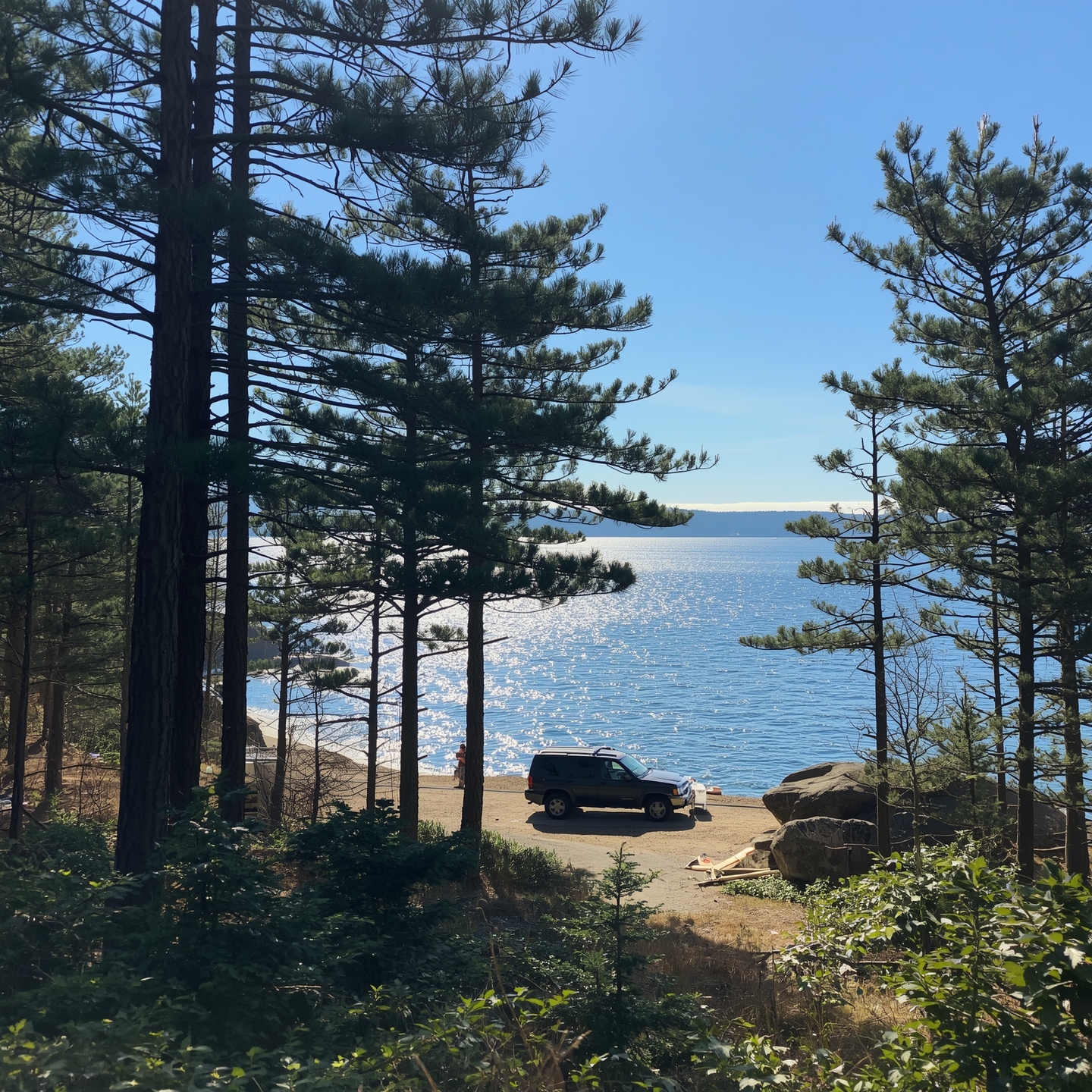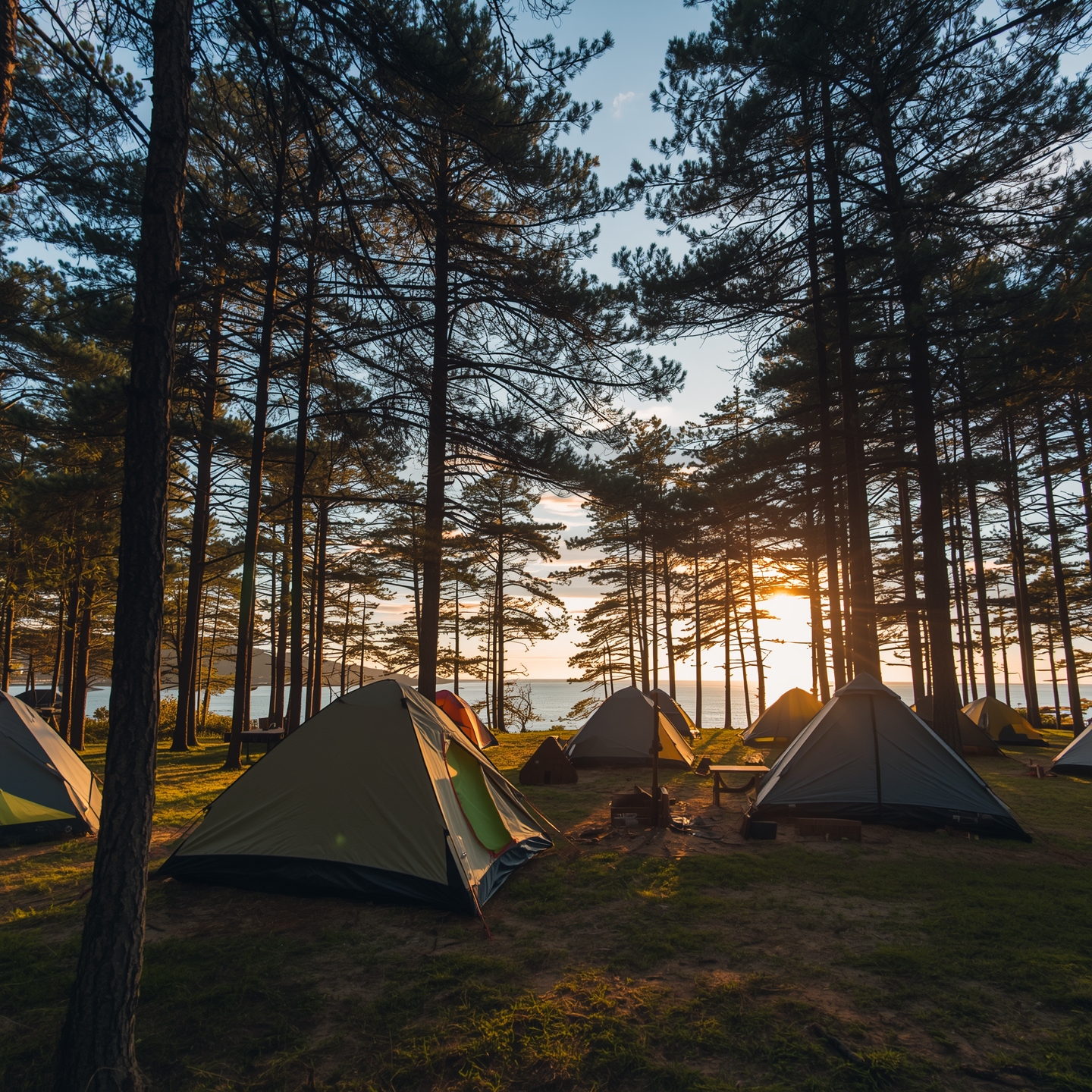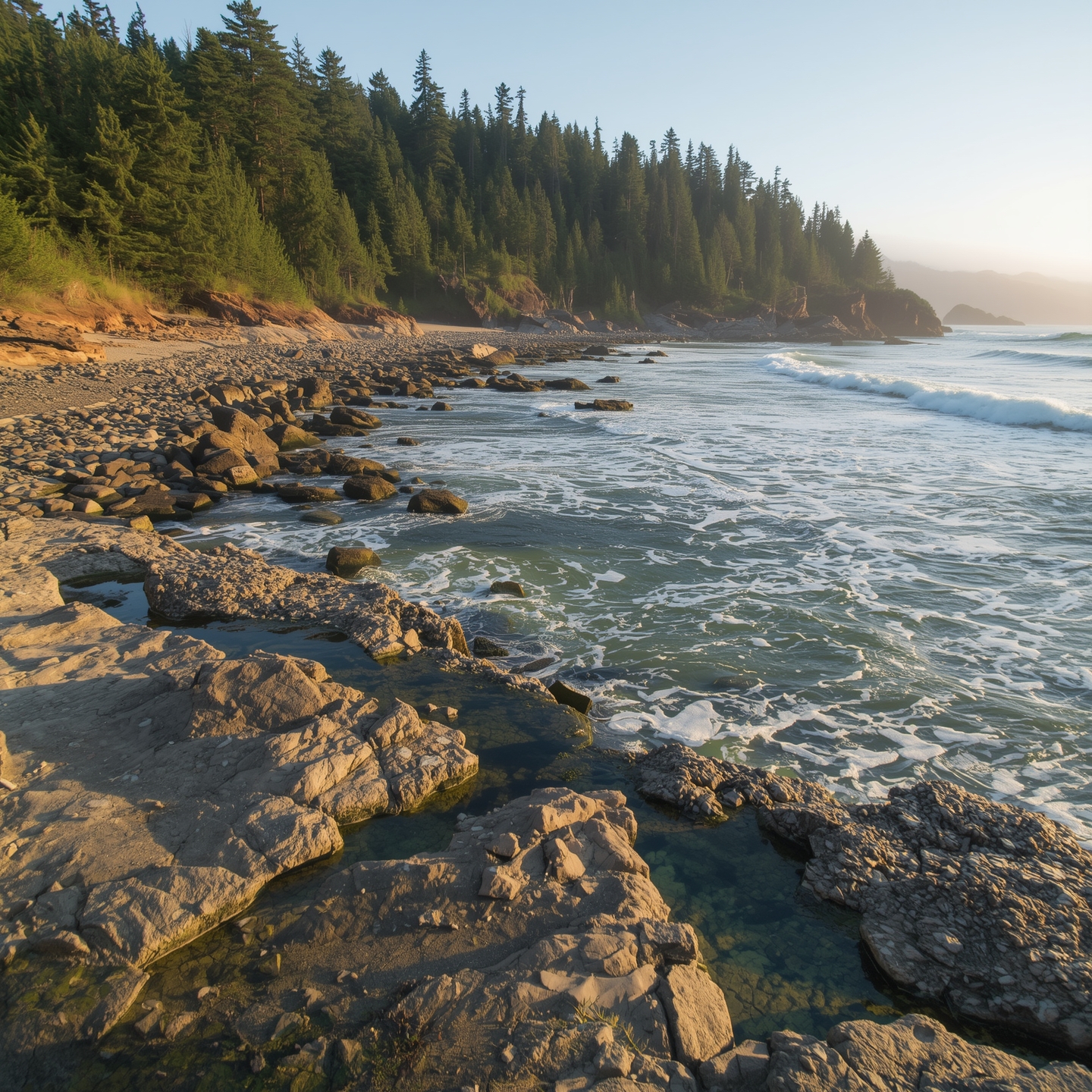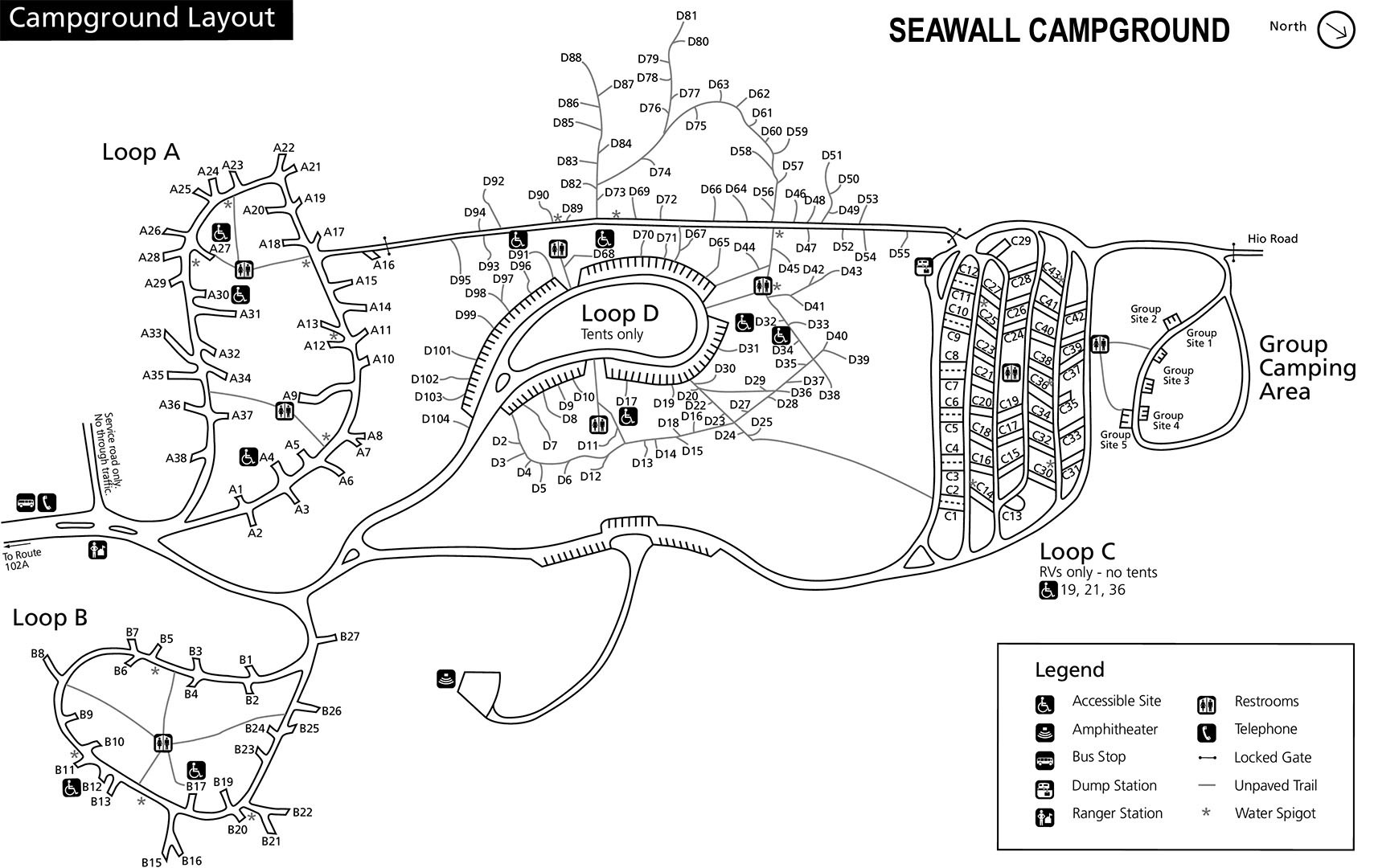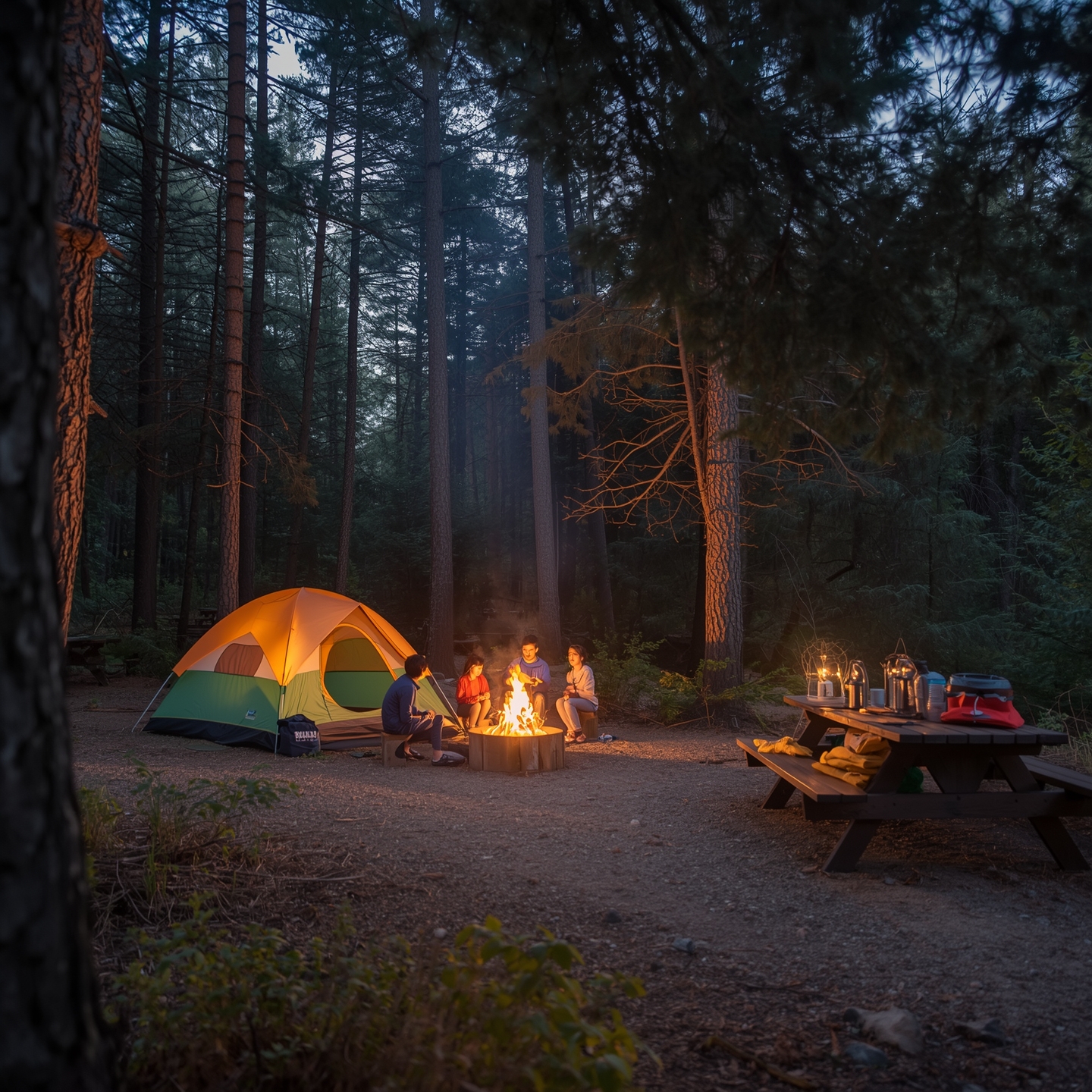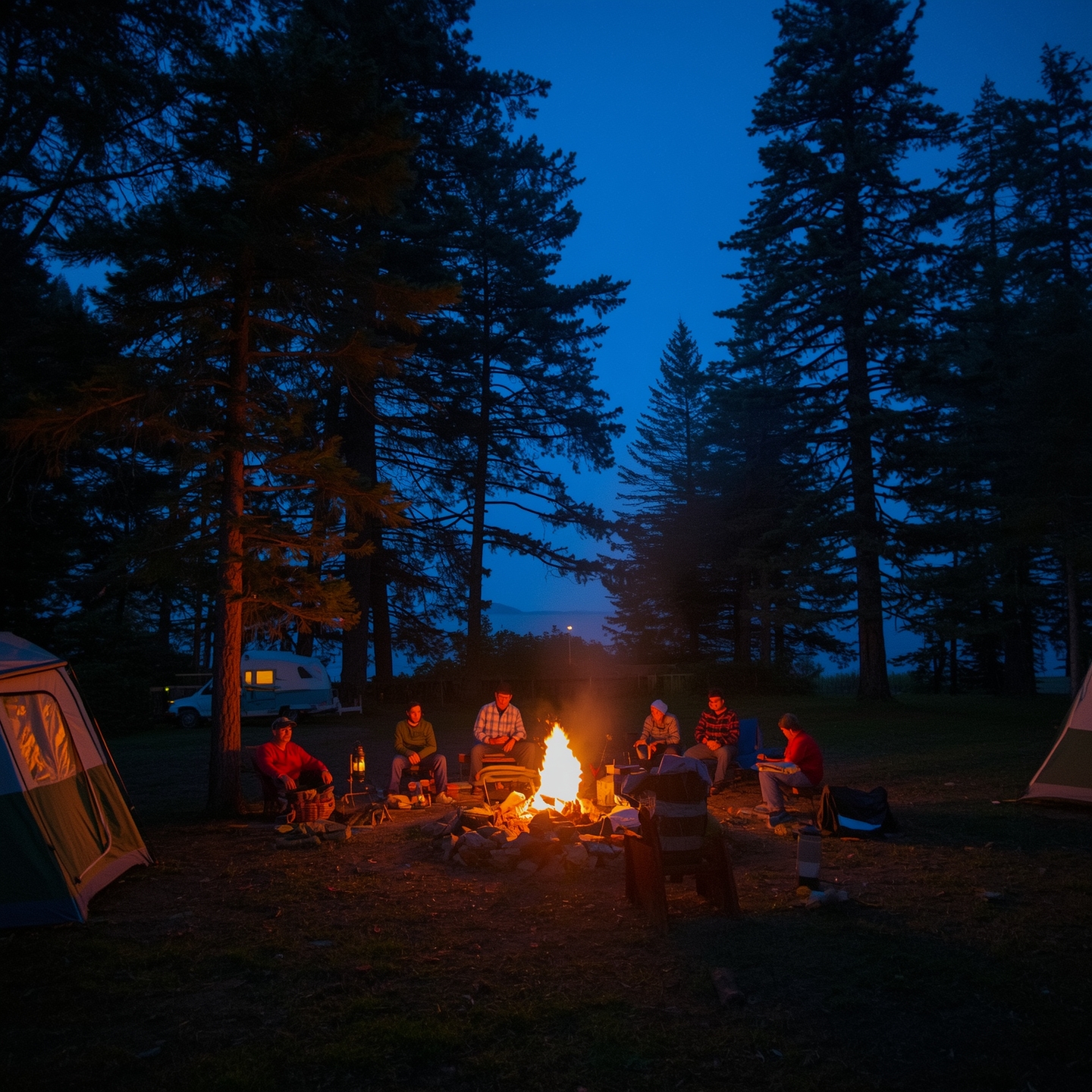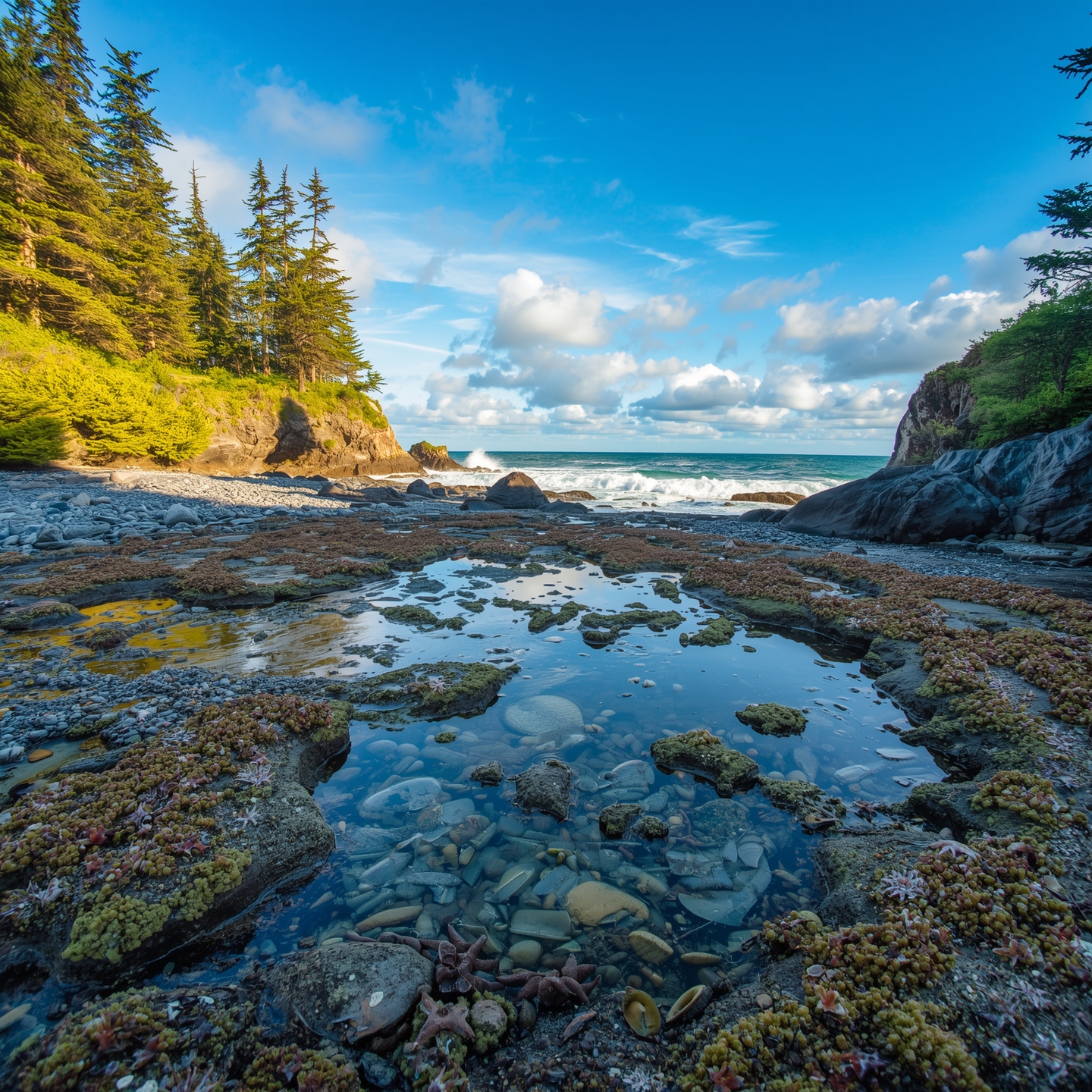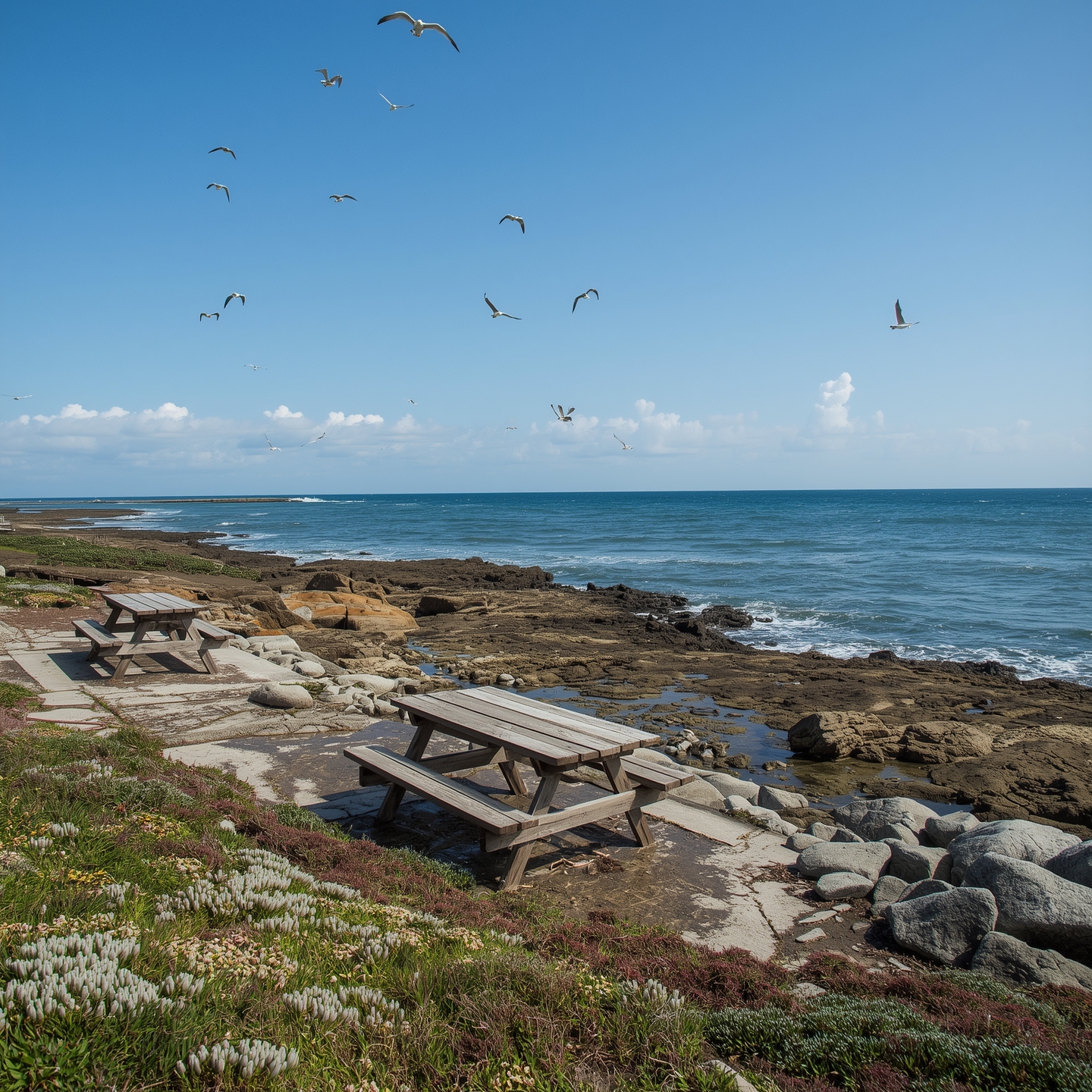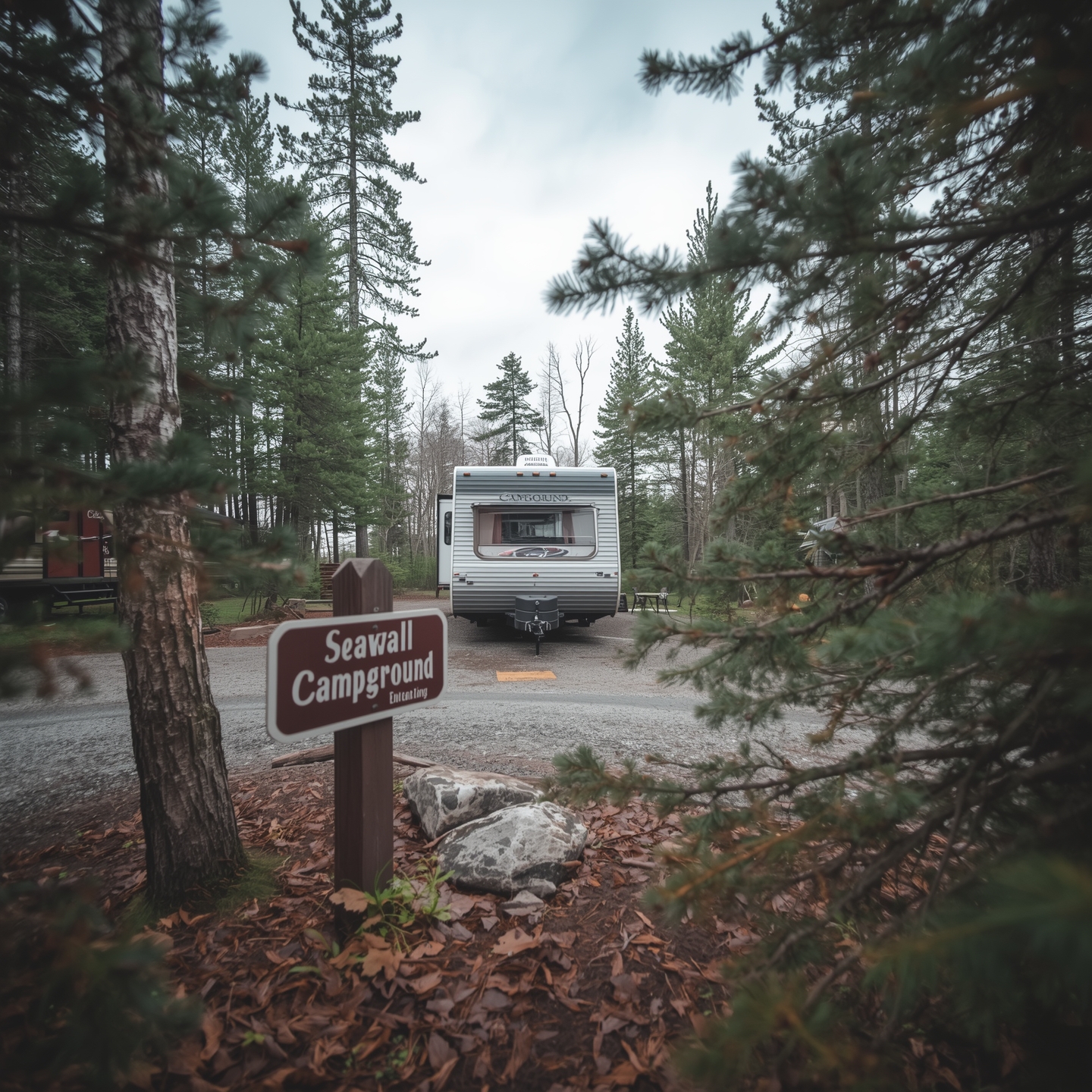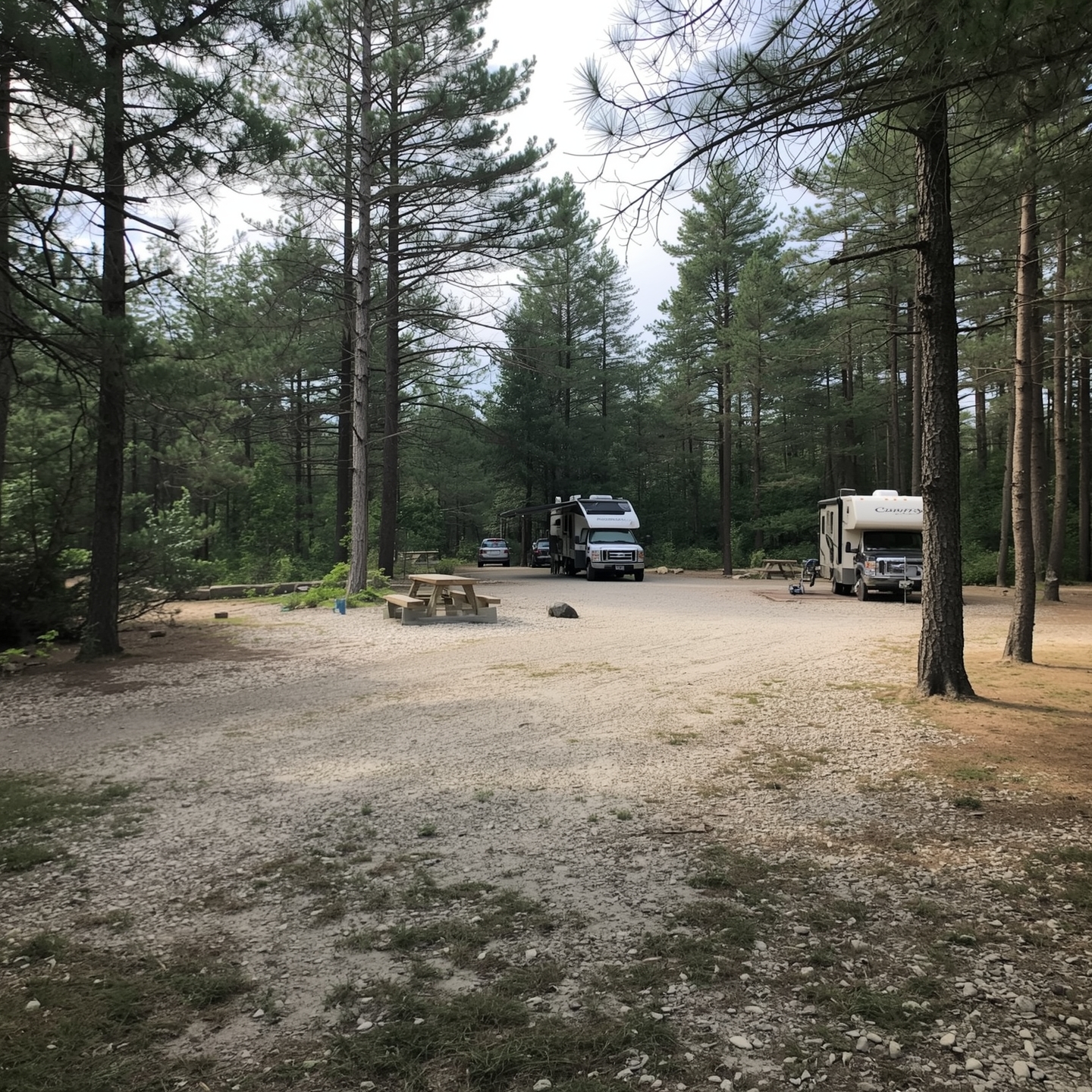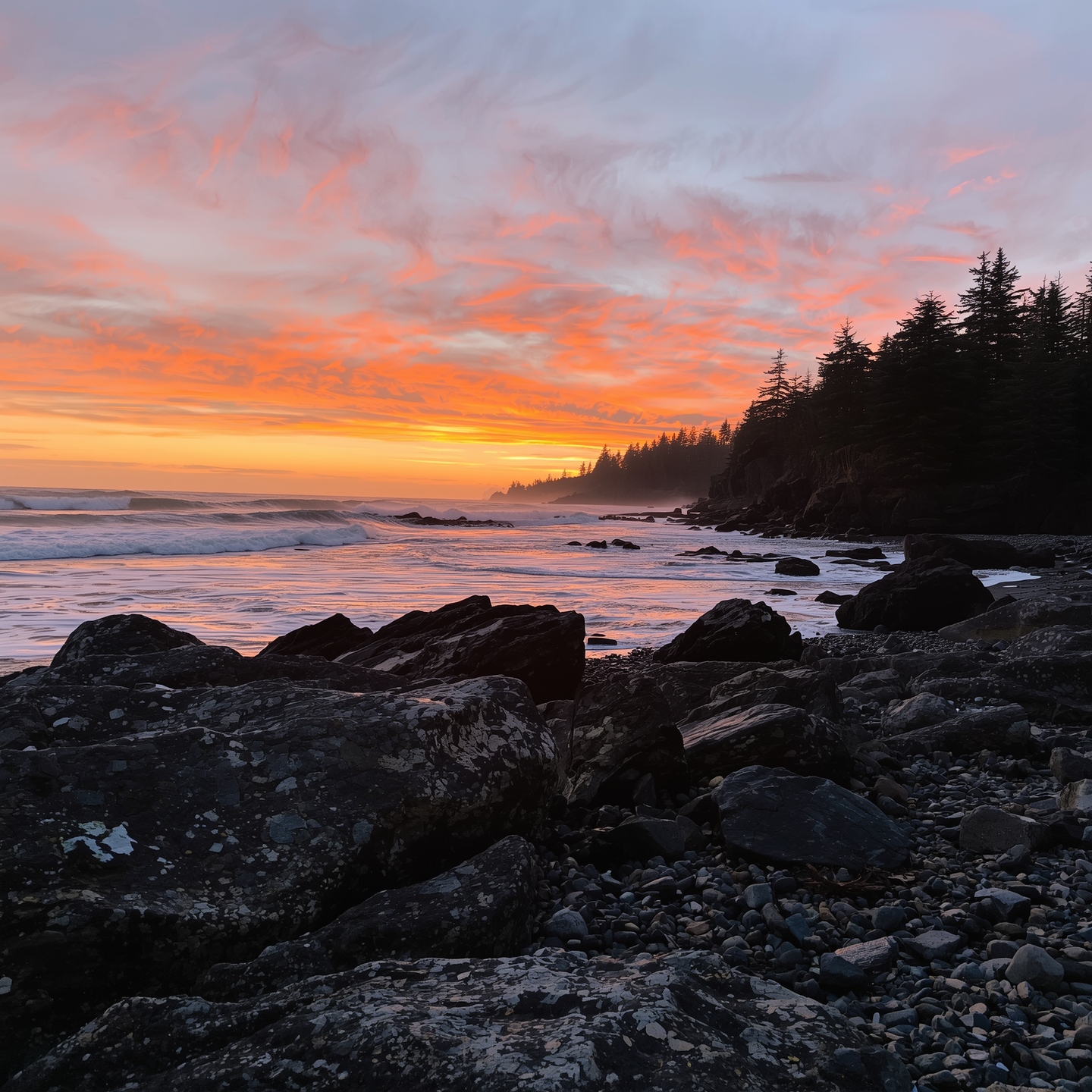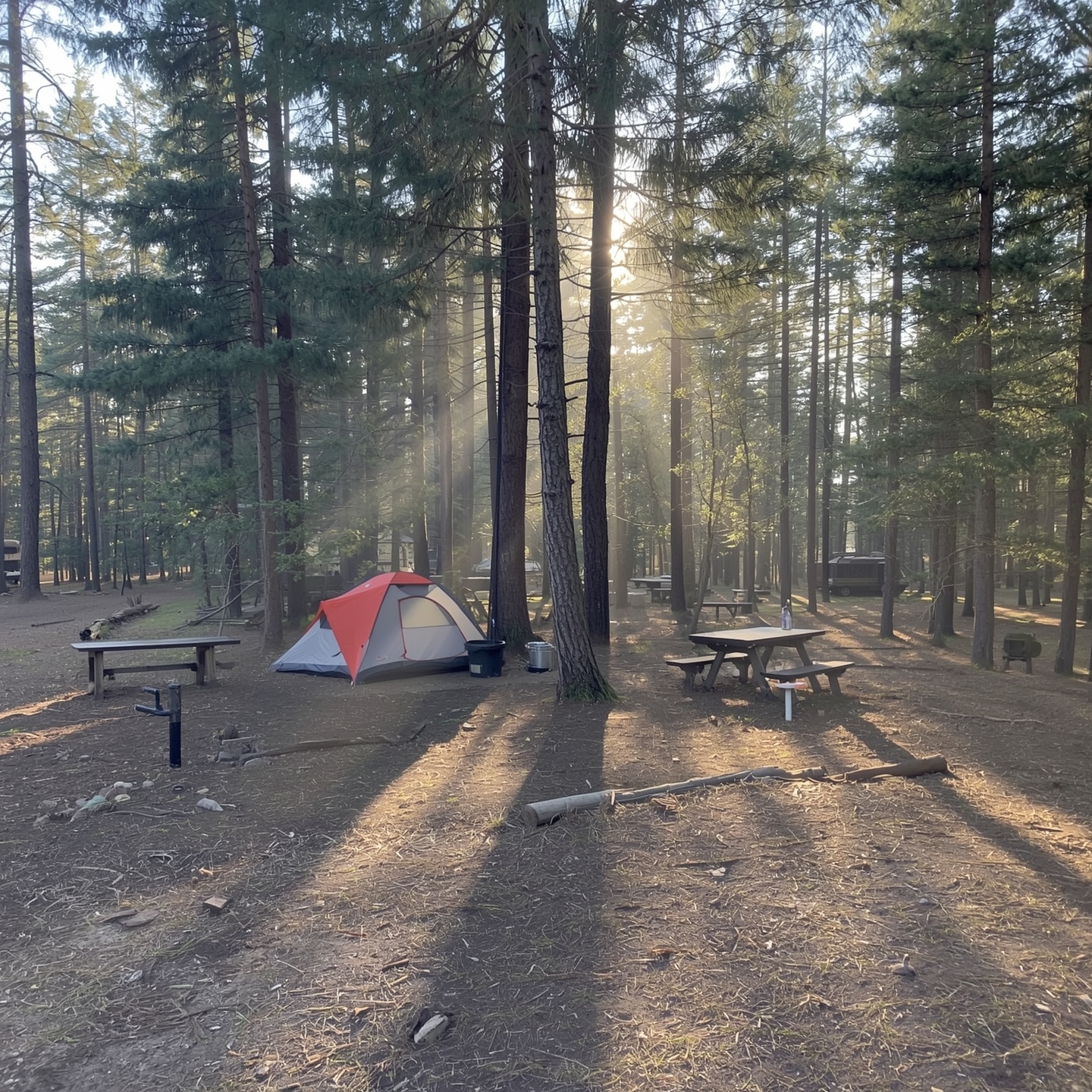Seawall Campground Acadia
Introduction to Seawall Campground Acadia
Seawall Campground Acadia is the park’s quieter oceanside campground, set on the rugged southwest coast of Mount Desert Island near Southwest Harbor, Maine. Unlike the busier Blackwoods Campground, Seawall offers a more laid-back atmosphere, where the sound of crashing surf and the scent of salt air drift into the forested campsites. For travelers looking to balance convenience with peace and quiet, this campground is often considered Acadia’s hidden gem.
The setting combines classic Maine woodland camping with the rare bonus of being just steps from the rocky Atlantic shoreline. Campers wake to the cry of seabirds, wander tidal pools at low tide, and enjoy evening sunsets over the water. It’s also a short drive to charming coastal towns like Southwest Harbor and Bass Harbor, giving you plenty of options for dining, supplies, and boat tours.
With more than 200 sites for tents, campers, and RVs, Seawall Campground is large enough to offer choice but small enough to maintain a relaxed, family-friendly vibe. Reservations are required, and the campground is open from spring through fall, making it a favorite for visitors who want to combine camping with a quieter, less crowded Acadia experience.
🌊 Oceanside location — just steps from the rocky Atlantic shoreline
🌲 Shaded forest sites for tents, campers, and RVs
🦞 Close to Southwest Harbor, Bass Harbor, and local lobster pounds
🚗 Easy access to Acadia’s trails, tidepools, and scenic drives
🌅 Peaceful alternative to busier Blackwoods Campground
Seawall Campground Acadia blends the best of Maine’s coast and forest, offering a quieter, family-friendly base for exploring the park.
Plan Your Stay at Seawall Campground
Staying at Seawall Campground means embracing a more traditional, rustic camping experience. There are no showers or hookups, which keeps the atmosphere simple and closer to nature. Campers will find over 200 sites suitable for tents, campers, and small RVs, making it a flexible choice for families, couples, and solo adventurers.
Because seawall campground acadia national park is less crowded than Blackwoods, many visitors consider it the best-kept secret for those seeking a peaceful oceanside stay. It’s also just a short drive from Southwest Harbor and Bass Harbor, where lobster pounds and local shops provide everything you need.
Plan Your Stay at Seawall Campground
On the quieter southwest side of Mount Desert Island, Seawall Campground offers a peaceful retreat for campers looking to step back from the busier parts of Acadia. Unlike Blackwoods, this oceanside campground is known for its slower pace, fresh sea breezes, and easy access to some of the park’s most scenic coastal spots. The rocky shoreline is just a short stroll from many sites, and the soothing sound of waves against the granite makes for a memorable camping soundtrack.
Staying at Seawall Campground means embracing a more traditional, rustic camping experience. There are no showers or hookups, which keeps the atmosphere simple and closer to nature. Instead of the hum of generators and crowded facilities, you’ll find crackling campfires, quiet evenings under star-filled skies, and a real sense of being part of Acadia’s natural environment. Campers will find over 200 sites suitable for tents, campers, and small RVs, making it a flexible choice for families, couples, and solo adventurers. Larger RVs can sometimes find it tricky here, so Seawall often attracts people who want to keep their camping experience modest and uncomplicated.
Because seawall campground acadia national park is less crowded than Blackwoods, many visitors consider it the best-kept secret for those seeking a peaceful oceanside stay. Its location makes it easy to explore the less-traveled Southwest Harbor area, where quiet trails, working harbors, and hidden coves invite discovery. It’s also just a short drive from Bass Harbor, home to the famous Bass Harbor Head Lighthouse, and a handful of local lobster pounds where you can savor a classic Maine feast. Shops, cafés, and small grocery stores in these towns make it easy to restock supplies without leaving the relaxed rhythm of this side of the island.
For visitors who want to balance a true camping feel with access to nearby communities, Seawall hits the sweet spot. You’re far enough from the bustle of Bar Harbor to avoid the crowds, but close enough to enjoy the same breathtaking scenery and park highlights. That balance — simplicity in camp, convenience just down the road — is what keeps people coming back to Seawall year after year.
• No showers or hookups — come prepared for rustic camping.
• Best for tents, pop-ups, and small RVs (larger rigs may find it tight).
• Book ahead — summer reservations fill quickly.
• Bring layers: evenings by the ocean can be chilly even in July.
• Visit nearby Bass Harbor Lighthouse and Southwest Harbor for supplies.
Seawall Campground Location and Setting
Seawall Campground Maine sits on the rugged southwest coast of Mount Desert Island, a part of Acadia National Park that feels quieter and more untouched than the busier Bar Harbor side. Its name comes from the nearby natural granite seawall — a striking, wave-battered stretch of rock that stands as a reminder of the Atlantic’s power and beauty. Walking along this shoreline, you can hear the rhythmic crash of the surf, smell the salt in the air, and watch seabirds wheel overhead, all while knowing your campsite is just steps away.
The campground itself is nestled within a coastal forest, where spruce and pine trees offer shade and shelter. Ocean breezes sweep through the woods, mixing with the scent of needles and earth, creating an atmosphere that feels fresh and wild. This combination of seaside and forest makes Seawall unique — a place where you can enjoy the best of both worlds without ever leaving your campsite.
What makes the Seawall Campground Acadia National Park location especially appealing is the variety of landscapes right outside your tent flap. Tidepools and rocky shores invite exploration, especially at low tide when crabs, sea stars, and periwinkles can be spotted in shallow pools. The surrounding forest provides a sense of seclusion, while easy trails connect campers to some of the park’s hidden gems. The famous Bass Harbor Head Lighthouse is just a short drive away, and trails like Wonderland and Ship Harbor offer gentle, family-friendly walks with big scenic rewards.
For campers who want to feel deeply connected to Acadia’s natural environment — hearing the ocean at night, smelling pine needles in the morning, and exploring coastal landscapes during the day — Seawall delivers an unmatched setting. It’s a destination where the rugged beauty of the Maine coast meets the quiet charm of the forest, all within the boundaries of Acadia National Park.
• Location: Southwest coast of Mount Desert Island, Acadia National Park
• Named after: Natural granite seawall nearby
• Landscape: Mix of rocky shoreline, tidepools, and coastal forest
• Nearby attractions: Bass Harbor Head Lighthouse, Wonderland Trail, Ship Harbor Trail
• Atmosphere: Rustic, oceanside, and less crowded than Bar Harbor
Seawall Campground Map
A Seawall Campground Maine map is one of the most useful planning tools for visitors, especially if you’re booking in advance. The map highlights the campground’s layout, including the four main loops, restroom facilities, potable water stations, and the central amphitheater where ranger programs are held during the summer season. Having a clear view of the campground before you arrive makes it easier to choose a site that matches your style of camping.
Families often prefer sites closer to the restrooms and water spigots, which make day-to-day needs simpler. Groups with young children sometimes select campsites near the amphitheater, since evening ranger talks and activities are only a short walk away. On the other hand, couples and solo campers seeking solitude tend to book spots along the outer loops, where sites are tucked into the trees and ocean breezes drift through the forest.
The Seawall Campground Acadia National Park map also helps visitors understand the spacing of sites. While the loops are well-shaded with spruce and pine, some sites are more open than others. The map gives you a good sense of which areas are close to the granite shoreline, and which offer more shelter in the woods. Planning with the map ahead of time can save you from last-minute surprises and ensures you land in a spot that enhances your overall camping experience.
• Four main loops with shaded forest campsites
• Restroom and potable water locations marked
• Amphitheater for summer ranger programs
• Family-friendly sites near central facilities
• Quieter outer-loop sites for privacy and ocean breezes
Campsite and Facilities
Seawall Campground Acadia National Park offers more than 200 sites thoughtfully laid out across four loops, giving visitors a wide range of choices. Tent campers can settle into cozy spots tucked beneath the spruce and pine canopy, while those traveling with small trailers or compact RVs will find sites designed to handle rigs without sacrificing the rustic feel. Unlike some modern campgrounds that lean heavily toward hookups and paved pads, Seawall stays true to its roots — a simple, woodsy retreat where the emphasis is on nature, not convenience.
Each campsite comes with the essentials for traditional camping: a picnic table, a fire ring for cooking or evening campfires, and nearby access to potable water. Flush toilets are available throughout the campground, and group camping areas are equipped with sturdy food storage lockers. These lockers not only keep food safe from Acadia’s curious wildlife but also make it easier for families and groups to relax without worry. Campers often remark that even without showers or electric hookups, the facilities are clean, reliable, and more than adequate for a stay immersed in the park’s wild beauty.
The absence of showers and hookups is frequently mentioned in Seawall Campground reviews, but instead of being a drawback, it’s usually highlighted as a positive. Many visitors appreciate the break from modern distractions and find that this stripped-back style of camping helps them reconnect with the basics: cooking over a fire, gathering under the stars, and falling asleep to the sound of ocean waves. Families often view it as an opportunity for kids to learn real camping skills, while couples and solo travelers enjoy the quiet simplicity.
One of the standout features of the campground is the centrally located amphitheater, which comes alive in the summer months. Here, rangers lead evening programs covering Acadia’s history, geology, and wildlife. These talks and presentations add a rich layer to the camping experience, transforming an ordinary night into an opportunity to learn and share stories under the open sky. Families particularly value the amphitheater because it offers both entertainment and education for children, while adults often enjoy the sense of community that builds as campers gather together.
Campsite settings at Seawall vary enough to satisfy different preferences. Those who want convenience can book sites near restrooms or the amphitheater, while campers craving privacy will gravitate toward the outer loops, where sites are spaced further apart and surrounded by forest. The air often carries a mix of spruce resin and salty sea spray, reminding visitors that the ocean is never far away. On clear nights, the lack of artificial light gives campers spectacular views of the stars — something reviewers often describe as a highlight of their stay.
In short, Seawall’s facilities strike a balance between providing the basics and encouraging a back-to-nature experience. With its picnic tables, fire rings, clean restrooms, food lockers, and ranger-led programs, the campground delivers comfort without overshadowing the rustic, oceanside character that makes it one of Acadia’s most beloved places to stay.
• 200+ shaded campsites for tents, trailers, and small RVs
• Picnic tables and fire rings provided at every site
• Flush toilets and potable water spigots throughout loops
• Food storage lockers at group sites for camper safety
• Amphitheater with summer ranger-led evening programs
• No showers or hookups — a true rustic camping experience
Atmosphere and Experience
Camping at Seawall Campground Acadia National Park feels like stepping back to a simpler time, where the focus is on the natural world rather than modern conveniences. Evenings are marked by the soothing rhythm of waves rolling against the granite seawall, mingled with the crackle of campfires and the murmur of conversation drifting through the forest loops. The air carries a mix of salty sea spray and spruce, and on still nights, the faint smell of woodsmoke lingers as campers settle into their tents.
Mornings often begin with the calls of seabirds and the first rays of sunlight filtering through the pines. It’s a quiet, unhurried start that contrasts sharply with the bustle of nearby Bar Harbor or the busy energy of Blackwoods Campground. Nights at Seawall tend to be darker, quieter, and more peaceful than elsewhere in the park — perfect for stargazing thanks to minimal light pollution. Many visitors describe falling asleep to the sound of the Atlantic as one of the most memorable parts of their stay.
Compared to Blackwoods, Seawall feels more spacious and relaxed. Sites are set further apart, creating a stronger sense of privacy, and the absence of showers and hookups keeps the crowds thinner. This has earned Seawall a reputation as a hidden gem for campers who want to enjoy Maine’s rugged coastline without sacrificing tranquility. Families appreciate the safety and seclusion, couples enjoy the romantic seashore atmosphere, and solo travelers find the forested loops a perfect backdrop for solitude and reflection.
Photos of Seawall Campground Acadia Maine often capture this atmosphere: shaded forest campsites tucked beneath tall spruce, children exploring tidepools nearby, and families gathering under lantern light for ranger-led evening programs at the amphitheater. Just as much as its location, it’s the atmosphere that defines Seawall — a place where slowing down feels natural, and every moment connects you more deeply to Acadia’s wild coastal beauty.
Things to Do Nearby
Staying at Seawall Campground Acadia puts you within easy reach of some of the park’s quieter treasures, far removed from the busier crowds around Bar Harbor. This makes Seawall not only a peaceful place to camp, but also one of the seawall campground best sites to use as a base for exploring Acadia’s lesser-known highlights. Whether you want a short stroll with the family, a classic lighthouse photo, or a taste of fresh-caught lobster, you’ll find it just minutes away.
- Wonderland Trail & Ship Harbor Trail — Two of Acadia’s most family-friendly hikes begin only a few minutes from Seawall. Both trails are under two miles, flat, and perfect for children. They wind through spruce forest before opening onto rocky shorelines where tidepools teem with crabs, periwinkles, and sea stars. At low tide, these coastal paths become natural classrooms for curious kids and a photographer’s dream for adults.
- Bass Harbor Head Lighthouse — A short drive from the campground takes you to one of Acadia’s most iconic landmarks. Perched on a rocky headland, Bass Harbor Head Lighthouse is especially magical at sunset, when the sky glows pink and orange behind the white tower. It’s one of the most photographed places in Maine, and many campers at Seawall consider it a must-see during their stay.
- Southwest Harbor — Just a few miles away, this working fishing village offers a slower pace than Bar Harbor. Visitors can enjoy fresh lobster at local pounds, browse through small shops, or join a boat tour to see the coastline from the water. For campers looking to combine rustic nights in the forest with a taste of coastal culture, Southwest Harbor provides the perfect complement.
- Seawall Picnic Area — Located right across the road from the campground, this oceanside spot is ideal for a midday break. Picnic tables are scattered along the shore, where breezes roll in off the Atlantic and seabirds swoop overhead. It’s a favorite for families who want to pack a lunch and soak in the scenery without straying far from their campsite.
With this variety of nearby activities — trails, landmarks, villages, and picnic spots — Seawall Campground strikes a perfect balance between rustic seclusion and convenient access to some of Acadia’s best experiences.
• Walk Wonderland & Ship Harbor Trails for family-friendly coastal hikes
• Visit Bass Harbor Head Lighthouse at sunset
• Explore Southwest Harbor’s shops, lobster pounds, and boat tours
• Relax at the Seawall Picnic Area just across the road
Seawall Picnic Area
Just across the road from Seawall Campground Acadia National Park, the Seawall Picnic Area is a favorite stop for both campers and day visitors. This oceanside stretch of granite and grass offers a line of picnic tables where you can enjoy a simple lunch with unforgettable views. The salty breeze rolls in off the Atlantic, seabirds circle overhead, and the sound of waves breaking against the natural seawall creates a backdrop that no restaurant could match.
For campers, the convenience is unbeatable. You can walk from your site with a packed lunch and settle in beside the water within minutes. Families often choose the picnic area as a midday break before continuing on to the Wonderland Trail or Bass Harbor Head Lighthouse, while couples enjoy it as a quiet spot for a romantic meal by the shore. Even if you’re not staying at Seawall, the picnic area is worth a stop as part of a scenic drive along Acadia’s southwest coast.
At low tide, the rocks beside the Seawall Picnic Area reveal tidepools filled with barnacles, periwinkles, and the occasional crab or starfish. Children love exploring these miniature worlds, and adults find them just as fascinating. The combination of oceanfront dining and natural discovery makes this one of the simplest yet most rewarding spots on Mount Desert Island.
It may not be as famous as Acadia’s big attractions, but for many visitors, the Seawall Picnic Area becomes a quiet highlight of their trip — a place where the pace slows, the view opens wide, and the rugged beauty of the Maine coast is experienced in its purest form.
Reservations and Practical Info
Planning ahead is key when staying at Seawall Campground Acadia National Park, as the campground’s rustic charm and oceanside location make it one of the park’s most sought-after spots. Knowing when it’s open, how to book, and what to bring will help ensure your trip goes smoothly.
- Season
Seawall Campground is typically open from late May through early October, covering both the peak summer season and the quieter shoulder months of spring and fall. July and August are the busiest times, with reservations filling up fast, while early June and late September tend to be less crowded and more relaxed. Many campers recommend the shoulder months for cooler weather, fewer bugs, and more open availability.
- Booking
All sites must be reserved in advance through Recreation.gov. Walk-ins are not accepted, making early planning essential. Reservations for the following season usually open months ahead of time, and popular summer weekends can sell out within days. Families who want specific loops or sites near restrooms often book the moment sites become available.
- Tips for Campers
Ocean breezes keep Seawall cooler than inland parts of Mount Desert Island, so packing extra layers is a must — even in July, evenings can feel chilly by the fire. Bug spray is essential for summer nights, particularly in June when mosquitoes and blackflies are at their peak. Since there are no showers in the campground, many campers plan day trips to Southwest Harbor, where facilities, laundromats, and small grocery stores are available.
- Firewood
To protect Acadia’s forests from invasive pests, outside firewood is not allowed. Campers must purchase firewood locally from park-approved vendors. Gathering wood within the park is prohibited, helping to preserve the campground’s natural surroundings and habitats.
- Quiet Hours
Seawall maintains a well-earned reputation as the quieter alternative to Blackwoods. Park rangers regularly patrol the loops to enforce quiet hours, ensuring that evenings remain calm and restful. This makes Seawall especially appealing to families with young children, as well as couples and solo travelers seeking a more relaxed camping experience.
• Season: Late May – Early October
• Booking: Reservations only, no walk-ins (via Recreation.gov)
• Essentials: Layers, bug spray, and plans for off-site showers
• Firewood: Must be purchased locally, gathering prohibited
• Quiet Hours: Enforced nightly by park rangers
Other Campgrounds in Acadia
While Seawall Campground Acadia National Park is beloved for its peaceful oceanside setting, it isn’t the only option within the park. If reservations are full, or if you’d like to compare different experiences, Acadia offers three other official campgrounds, each with its own personality and advantages.
- Blackwoods Campground — The most popular and centrally located campground in Acadia. Blackwoods is closest to Bar Harbor and Cadillac Mountain, making it the top choice for visitors who want easy access to restaurants, shops, and sunrise hikes. With over 300 sites, it’s larger and busier than Seawall, but offers the convenience of being right at the heart of the park.
- Schoodic Woods Campground — Located on the Schoodic Peninsula, this newer campground is praised for its spacious sites and modern design. Opened in 2015, Schoodic Woods is farther from Bar Harbor but rewards campers with quiet, dark skies, and access to the rugged Schoodic coastline. For those seeking seclusion and fewer crowds, it’s an outstanding alternative.
- Duck Harbor Campground — Tucked away on Isle au Haut, this is Acadia’s most remote and rustic camping option. Accessible only by mailboat, Duck Harbor features just five primitive sites. There are no amenities beyond basic facilities, but the reward is solitude and immersion in a wild, off-the-grid corner of the park. It’s ideal for adventurous campers who don’t mind carrying everything in and out.
Together, these options give campers flexibility. Whether you want the convenience of Blackwoods, the quiet of Schoodic Woods, or the rugged adventure of Duck Harbor, Acadia has something to match every style of camping.
• Blackwoods: Largest, busiest, closest to Bar Harbor & Cadillac Mountain
• Schoodic Woods: Modern, quiet, on the Schoodic Peninsula
• Duck Harbor: Remote, primitive, only on Isle au Haut
Wrap-Up
Seawall Campground Acadia is more than just a place to pitch a tent — it’s the park’s oceanside escape, where forested campsites blend with salty breezes, rocky shores, and the timeless rhythm of the Atlantic. Unlike Blackwoods, it offers a quieter and more spacious setting, making it especially appealing to families, couples, and anyone who values peace and nature over crowds and convenience.
Its location on the southwest side of Mount Desert Island puts you close to treasures like Bass Harbor Head Lighthouse, the tidepools along Wonderland and Ship Harbor Trails, and the working waterfront of Southwest Harbor. Evenings bring ranger talks at the amphitheater, mornings begin with seabird calls, and nights end under a canopy of stars. For many campers, Seawall becomes not just a base camp, but a highlight of their Acadia adventure — rustic, scenic, and unforgettable.
Whether you’re returning year after year or visiting for the first time, Seawall captures the essence of what makes Acadia so special: wild beauty, simple living, and a sense of connection to Maine’s rugged coast.
Back to Acadia Camping
Explore other Acadia campgrounds:
Blackwoods | Schoodic Woods | Duck Harbor
National Park Service — Seawall Information
Recreation.gov — Seawall Campground Reservations
Visit Bar Harbor — Local Dining & Visitor Info
Want insider tips on Acadia and beyond? Join our free newsletter and get fresh park updates, planning advice, and hidden gems delivered straight to your inbox.
Sign Up
